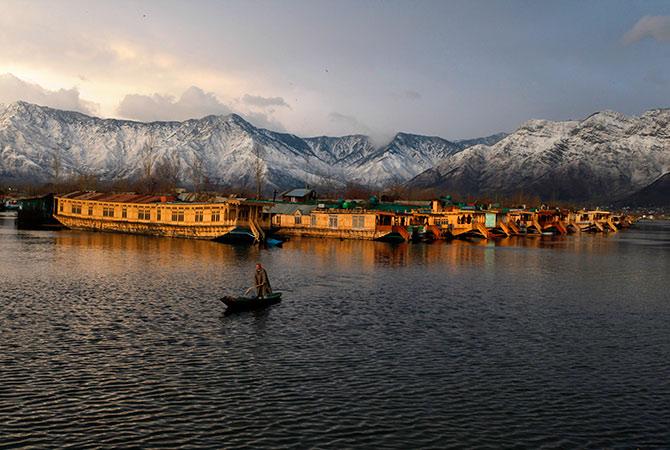 | « Back to article | Print this article |
It will require political and tactical genius to assuage the hurt feelings of the locals over the denial of their state's privileged status, and then to accommodate the national objectives of integration and development as spelt out by New Delhi, points out Amulya Ganguli.

While army chief General Bipin Rawat has said the armed forces are ready to 'retrieve' Pakistan occupied Kashmir, Jammu and Kashmir Governor Satyapal Malik nurtures the hope that his domain will become so prosperous that the people of PoK will simply walk into it.
He has also clarified that his orders to do so have come from the very top.
Defence Minister Rajnath Singh, on the other hand, has outlined the terms for any talks with Pakistan, by saying that these will be only on PoK.
There is a slight change of position here, for the government's earlier view was that the talks will not begin at all unless Pakistan puts an end to terrorism.
In the midst of these various assertions ranging from being battle-ready to scaling the heights of economic growth to laying down the terms for talking to Pakistan, BJP leader Ram Madhav has struck a somewhat sober note.
According to him, the 'anschluss' (annexation) of PoK can wait till normalcy is restored in J&K.
But he hasn't specified a time-limit.
At the moment, there is still no certainty when those at the receiving end of the lockdown will be able to live the kind of life which they did before the August 5 deprivation of their state's special status.
Although some of the restrictions are being removed -- landlines, for instance, are being restored -- others still remain in place, notably the mobile telephone network even if the curbs are on their way out.
But when will the incarcerated politicians and activists be released.
Unless they are allowed back in their homes and to hold public meetings, it will not be possible to say that the good old days are back.
As of now, it is obvious that the government is wary of taking such a step since it is unsure of what will happen once the three former chief ministers -- Farooq and Omar Abdullah and Mehbooba Mufti (who are all highly articulate speakers) -- come out of detention along with prominent activists like Shah Faesal of the newly-formed People's Movement and Junaid Azim Mattu, the mayor of Srinagar.
If the crowds throng the streets to welcome them, the government will be in a quandary about how to respond.
The government will be even more worried if the politicians give a call to protest against the abrogation of Article 370, albeit peacefully.
It is not only what the politicians will say or do which will be keenly watched in India and abroad, it is also the reaction of the ordinary people which will be of prime importance.
True, there may be agents provovateurs from Pakistan.
Indeed, it is the latter with their acts of violence who will distort and divert attention from the genuine views of the ordinary Kashmiris.
As a result, the scene will remain confused and fraught with tension.
For the average Kashmiri, Pakistan's excessive interest in Kashmir is damaging his interests.
While Pakistan is playing its own geopolitical game aimed at causing mayhem in the region to draw international attention to an area of a nuclear flashpoint, the Kashmiris have become helpless playthings in Pakistan's hand.
Since even a genuine expression of distress over the snuffing out of Article 370 can be interpreted by New Delhi as Pakistan's malign handiwork, it will be extremely difficult for the state's politicians and activists to take a position which does not tally with the government's without arousing the suspicion of playing Pakistan's game.
The mixing of India's internal matter with Pakistan's longstanding plan of annexing Kashmir -- the missing 'K' in Pakistan's name -- has made the scene immensely complicated, making it extremely difficult for those Kashmiris with the interests of both their state and of India at heart to act in a manner which will be recognised as being free of Pakistan's machinations.
It will require political and tactical genius to, first, assuage the hurt feelings of the locals over the denial of their state's privileged status, and then to accommodate the national objectives of integration and development as spelt out by New Delhi.
It will be a tightrope walk for those local leaders who are engaged in coming to terms with the new reality in Kashmir, for they will have to dispel any misconception of being New Delhi's puppets while ensuring that the people of the state recover their poise and self-respect.
The authorities can aid the process by scaling down the presence of the security forces although such an initiative carries the risk of attacks by the Pakistani terrorists, including fidayeens or suicide bombers, which wiil set the scene back to square one.
Clearly, it is a long haul for everyone interested in Kashmir's welfare.
Amulya Ganguli is a writer on current affairs.